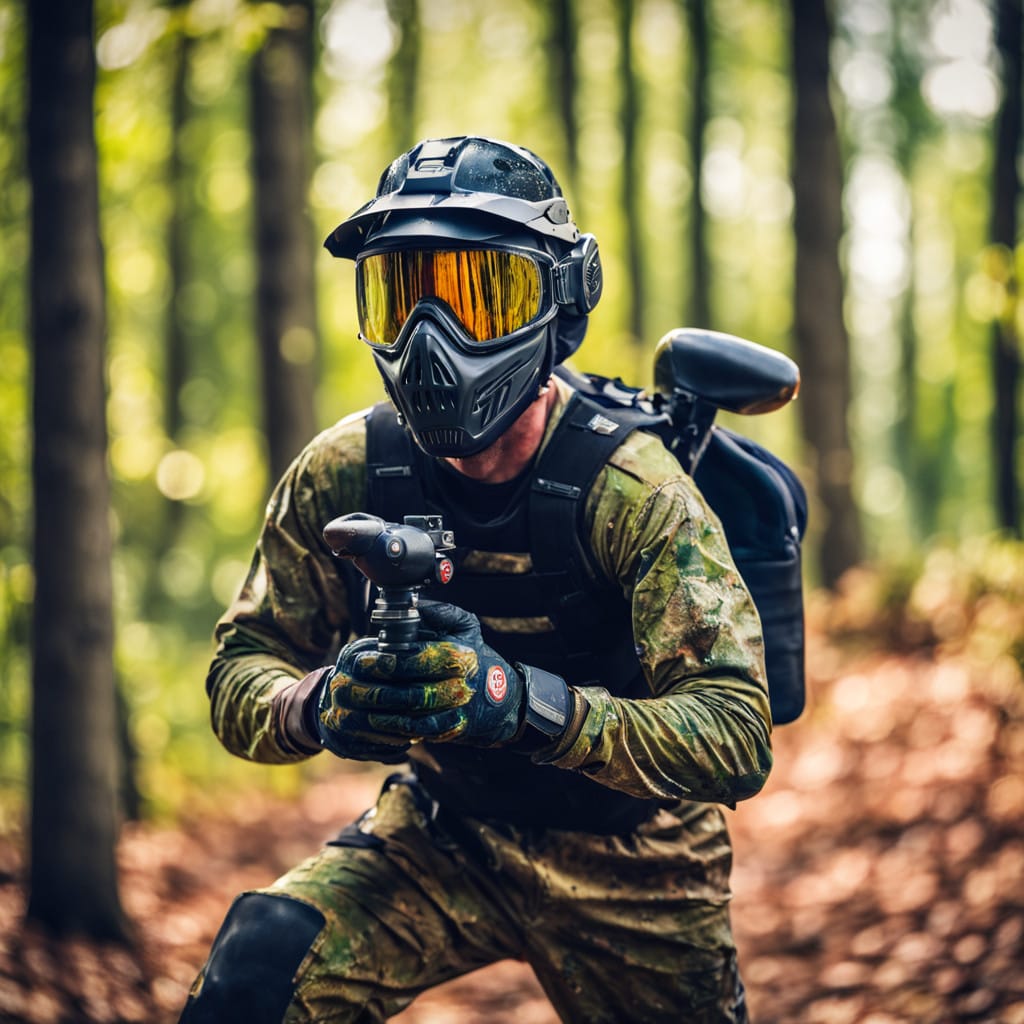The Thrilling World of Paintball

Origin and History
Paintball, an exhilarating and strategic team sport, has captivated players worldwide. The sport originated in the early 1980s. It all began in June 1981 when Bob Gurnsey, Hayes Noel, and Charles Gaines developed the concept. They were inspired by Nelson Paint Company’s paint markers, which were initially used for marking trees and livestock.
The first official game took place in New Hampshire. Twelve players participated, using these paint markers to capture flags placed at various points. This event marked the birth of Paintball as a competitive sport. The enthusiasm generated by this game led to the establishment of the first commercial paintball field by Bob Gurnsey in 1982, opening the sport to a broader audience.
Paintball’s popularity surged rapidly. By the mid-1980s, organized leagues and tournaments began to emerge. These events provided structured competition and attracted a diverse range of participants. The sport continued to evolve with technological advancements. The introduction of semi-automatic markers in the late 1980s revolutionized the game, allowing for faster and more accurate shooting.
The 1990s saw a significant expansion of Paintball’s reach. The sport gained international recognition, with fields and tournaments appearing in various countries. The creation of the first professional Paintball league, the National Professional Paintball League (NPPL), in 1992, further cemented its status.
Global Popularity
Paintball’s appeal has transcended borders, making it a global phenomenon. Today, Paintball fields are found in numerous countries, each contributing to the sport’s vibrant and diverse community. North America remains a hub for Paintball. The United States and Canada boast numerous fields, ranging from dense forests to urban landscapes. Major cities host large-scale tournaments, attracting participants from around the world.
Europe has embraced Paintball enthusiastically. Countries like the United Kingdom, Germany, France, and Russia have well-established fields and leagues. In these regions, it is played both recreationally and competitively. Major European tournaments, such as the Millennium Series, draw international teams and spectators.
Asia has also seen a growing interest in Paintball. Countries like Japan, South Korea, and Malaysia have developed thriving Paintball communities. The sport’s unique blend of physicality and strategy resonates with many players in this region.
In Australia, Paintball enjoys considerable popularity. The country’s vast landscapes provide ideal settings for diverse Paintball scenarios. Major cities host competitive leagues, and recreational fields cater to enthusiasts of all skill levels.
Latin America has not been left behind. Countries such as Brazil, Argentina, and Mexico have vibrant Paintball scenes. Tournaments and leagues are well-attended, reflecting the sport’s broad appeal.
Amateur Paintball: Youth and Schools
Amateur Paintball is the foundation of the sport’s growth. It serves as an entry point for young players and fosters a sense of community. Many fields offer beginner-friendly environments, where newcomers can learn the basics in a safe and supportive setting.
Youth involvement in Paintball is encouraged through organized events and leagues. These programs emphasize teamwork, strategy, and sportsmanship. Schools and youth organizations often include Paintball in their extracurricular activities, recognizing its potential to teach valuable life skills.
In the United States, high schools and colleges sometimes feature Paintball clubs. These clubs provide students with opportunities to participate in local and national competitions. The National Collegiate Paintball Association (NCPA) organizes intercollegiate tournaments, offering a platform for young players to showcase their skills.
Internationally, similar initiatives exist. European countries have youth leagues that nurture young talent. In Asia, community centers and schools organize Paintball events to engage young players. These programs not only promote physical activity but also foster a sense of camaraderie among participants.
Paintball’s accessibility and adaptability make it an ideal sport for youth and amateur players. Whether in organized leagues or casual weekend games, amateur Paintball provides a fun and challenging experience for all ages.
Professional Paintball Leagues
Professional Paintball has evolved into a highly competitive and organized sport. Several leagues and tournaments have gained prominence, attracting top-tier talent and significant audiences.
The National Professional Paintball League (NPPL) in the United States is one of the oldest and most prestigious leagues. It hosts several events each year, culminating in a championship that crowns the best team. The league features various divisions, catering to different skill levels.
The Paintball Sports Promotions (PSP) league, also based in the United States, is another major organization. Known for its high level of competition, the PSP hosts events that draw international teams. The league’s structured format and stringent rules ensure a professional and exciting atmosphere.
Europe’s Millennium Series is a premier Paintball league, attracting teams from across the continent. The series consists of multiple events held in different countries, culminating in a grand finale. The league’s emphasis on fair play and sportsmanship has earned it a reputation for excellence.
The National Xball League (NXL) is another prominent league with a global reach. It hosts events in the United States and Europe, providing a platform for top teams to compete. The NXL’s fast-paced and dynamic format has made it a favorite among players and fans alike.
In addition to these major leagues, numerous regional and national leagues exist worldwide. These leagues provide opportunities for teams to compete at various levels, from amateur to professional. The diversity of competition ensures that Paintball remains an exciting and evolving sport.
Political and Social Significance
Paintball holds significant political and social importance. It serves as a platform for promoting teamwork, strategy, and fair play. These qualities are essential in fostering a sense of community and cooperation.
Politically, Paintball has faced challenges. In some countries, strict regulations govern the use of Paintball markers. Advocates argue that the sport promotes physical activity and responsible behavior. Efforts to relax restrictions and promote it as a legitimate sport have been ongoing.
Socially, it breaks down barriers. Players from diverse backgrounds come together to compete and enjoy the game. The sport fosters inclusivity, as individuals of all ages and abilities can participate. Paintball events often have a festive atmosphere, with players and spectators engaging in friendly interactions.
It also has therapeutic benefits. Military veterans and individuals with PTSD have found relief through Paintball. The sport provides a controlled environment where participants can release stress and build confidence. Paintball’s strategic nature encourages critical thinking and decision-making, skills that are valuable in everyday life.
Community outreach programs often use Paintball to engage at-risk youth. These programs emphasize discipline, teamwork, and positive behavior. By providing a constructive outlet, it helps steer young people away from negative influences.
Rules of Paintball
Understanding the rules of Paintball is crucial for both safety and enjoyment. While variations exist, the fundamental principles remain consistent across different formats.
In Paintball, players use markers to shoot paint-filled pellets at opponents. The objective is to eliminate opponents by marking them with paint. Players must adhere to safety guidelines, such as wearing protective gear, including masks, to prevent injuries.
Games are typically played on designated fields with various obstacles. The terrain can vary, from wooded areas to urban settings. Fields are marked with boundaries, and players must stay within these limits.
Paintball games can have different formats. One popular format is “Capture the Flag,” where teams compete to capture the opposing team’s flag while defending their own. Another common format is “Elimination,” where the goal is to eliminate all opponents.
Before the game begins, referees brief players on the rules and safety protocols. Referees oversee the game, ensuring fair play and enforcing rules. They can call players out if they are hit or violate rules.
When a player is hit, they must raise their marker and call out “Hit” to signal their elimination. Players can re-enter the game if the rules allow for respawns or reinforcements. In some formats, eliminated players must wait until the next round to rejoin.
Communication is vital in Paintball. Teams strategize and coordinate their movements to achieve objectives. Players use hand signals, radios, or verbal communication to relay information and plan tactics.
Fair play and sportsmanship are emphasized. Cheating, such as wiping off paint marks or overshooting opponents, is strictly prohibited. Players are expected to respect opponents and adhere to the rules.
Conclusion
Paintball is an exciting and dynamic sport with a rich history and global appeal. From its humble beginnings in the early 1980s to its status as a competitive and organized activity, it has captured the hearts of players worldwide. The sport’s popularity spans continents, with fields and leagues in North America, Europe, Asia, Australia, and Latin America.
Amateur Paintball provides a gateway for youth and newcomers to experience the thrill of the game. Schools, youth organizations, and community centers play a crucial role in promoting the sport. Professional leagues, such as the NPPL, PSP, Millennium Series, and NXL, offer a platform for elite competition and showcase the sport’s highest level of play.
Paintball’s political and social significance cannot be overlooked. The sport promotes teamwork, strategy, and fair play, fostering a sense of community and inclusivity. It also serves as a therapeutic outlet for individuals with PTSD and engages at-risk youth through community outreach programs.
Understanding the rules of Paintball ensures a safe and enjoyable experience for all participants. Whether played in casual settings or competitive leagues, it offers an exhilarating and strategic challenge.
In conclusion, Paintball’s impact is profound, extending beyond the thrill of the game. It unites people from diverse backgrounds, promotes positive values, and provides a platform for physical and mental growth. As Paintball continues to evolve, its legacy as a beloved and influential sport will endure.





